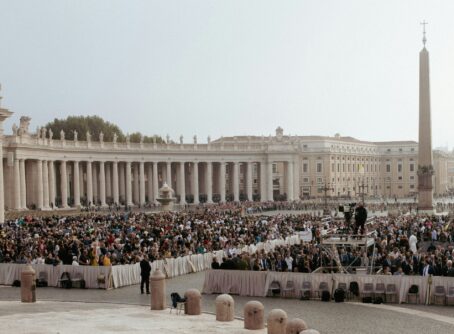
Several years ago, I was on the campaign trail speaking with voters and community stakeholders, coordinating fundraisers, and interacting with public officials in an election that we knew would be an uphill battle. Our candidate was the incumbent; a long-time state senator who knew every street, business, and leader in the community. Still, it was a challenging campaign because the world was changing.
I vividly remember one experience that I still reflect on to this day. After a long day of “lit-dropping” (dropping campaign literature in people’s doors), a woman from church asked me, “How can I become meaningfully involved in politics? Do I have to take part in election politics to have influence?” At this time, I had thought I was part of the “in” of state politics. I knew my state history, could identify the key players by name, was beginning to perceive the trends, and was a campaign manager. Yet I was dumbfounded. I had no real answer for this question.
The woman’s question has stayed with me, as it represented a gap in my thinking. I found political engagement meaningful because I was in leadership. Outside of leadership, I had never truly seen or felt this kind of potential. I wanted to believe that individual political participation was impactful, but I did not believe it previously. So, what was I to say to this eager voter who did not have time to run for office, couldn’t lead a campaign, or didn’t have the capacity to make a large donation? Should I defy my conscience by providing her with an answer that I did not fully believe?
That is exactly what I did. I responded with the typical high-school civics class mantra of, “Your vote has value and your voice matters to politicians – so write to them often!” Yet, I was as aware of gerrymandering as the next guy and had witnessed campaigns copying and pasting email responses to hundreds of voters for the sake of time.
My response that day showed how political achievement had clouded my judgment. I was influencing as an individual, without clarity as to how Christians – plural – could get involved. Further, I fell into the trap of believing that political engagement revolves around state and federal elections, completely missing the larger picture.
So, even while putting my hands to work in affecting the community, I did not fully understand what politics was or what Gospel-driven political engagement looked like. Over the years I have met a lot of people who think the way I thought.
Too many Christians are looking at the national and international politics of our day and seeing that space as the primary locus of meaningful political engagement. In an information-rich age, we are drawn to define politics by election-related activity and participation as awareness of trending events. However, this can become a preoccupation that does not mesh with the Gospel’s teaching on doing justice.
Ultimately, Christianity redefines political engagement by expanding our definition of politics and by challenging us to enter the “gaps” in society; wrestling through the politics of our hearts, churches, and local communities. Today, we need to see and apply the Gospel’s style of politics: relational politics.
CHRISTIANITY REDEFINES POLITICS
In the American context, we often speak of “politics” as an institutional activity where governments legislate, make decisions, draft policy, and enforce laws. However, our conception of the “political arena” is too often power-centric or uncompromisingly factional, even if we qualify our words with terms like “human flourishing,” “the common good,” or “rule of law.” Some Chrsitians are having a hard time answering the question, “How can we be involved in politics?” because we feel pulled in two different directions. We feel called to influence in the name of Jesus but also to avoid the nastiness of “politics” as we see it in our election cycles and policy debates.
Jonathan Leeman argues in Political Church that, both in theory and in practice, Christianity is inherently political and impacts the health of government and individual citizens alike. Why? For starters, in the New Testament the early church became known as an εκκλεσία, which means a “public assembly”. In the New Testament period, this was a distinctively political term, aimed at showing how the church was guided by Jesus’ eternal reign. The church was not above, below, or removed from political engagement, meaning that “neither politics nor religion” could be “so easily compartmentalized.”
“Christianity redefines political engagement by expanding our definition of politics and by challenging us to enter the “gaps” in society.
Leeman writes that the church, as a vessel of God’s holy sovereignty, “exists to display the righteousness, justice and love of the triune God. It is to exemplify for the nations what a true politics looks like. And in so doing it represents the King who possesses all authority on heaven and earth, and who therefore lays claim upon the nations. All humanity is called to repentance and faith, fealty and honor.” To be clear, the church and the state have different roles and responsibilities – one to proclaim the Gospel and the other to rule with justice – but you can already see the strict boundaries of “politics” being pushed wide open.
The church does not contribute to the political work on earth distantly. Its very presence interacts with our American system of governance in important ways. This means that both the language and activity of the church need a new definition of politics, one that is not power hungry, factional, or dismissive.
Instead, Christianity redefines politics as something we are all committed to pursuing. Politics is a community-driven activity to govern and guide the relational ordering of society – those areas of tension or conflict that will inevitably arise when groups of people live in proximity. From the sidewalks built, potholes filled, boats inspected, water tested, education styles promoted, and professional certifications required for work, we need help communing with one another.
RELATIONAL POLITICS PRINCIPLE #1: POLITICS STARTS IN YOUR HEART
Jesus is a rather unusual character. As part of His journey to Jerusalem before His crucifixion, He rode a donkey through masses of large crowds who shouted that He was the King (Lk. 19:38). If He had said the word, the crowd would have gone to war on His behalf, taking back a nation that had sunk deeper and deeper into their own idea of reality and away from what was glorifying to God.
Instead, Jesus cries.
In Luke 19:41, the Gospel narrative records something remarkably different from what the reader expects. This is the historical moment where you expect change to take place – all hopes are high as restoration is near. Instead, there is sadness and simply more brokenness.
Jesus does not point to the Pharisees, Sadducees, or Roman government as the cause of His grief; rather, it is simply us. He uses words including “had you known,” “they are hidden,” and “did not know,” to communicate that individuals forming the collective whole had blinded themselves so badly that they called “peace” what was sinful (Luke 19:42, 45) and misunderstood Jesus’ words detailing the purpose of his activity (Luke 18:34). We missed the root of the matter – that our hearts are to blame for the burning wreckage of our world.
This dark statement must be our starting place, because our hearts are in a continual battle. This contest, whether knowingly or unknowingly, contributes to both the health and decay of our political system.
If we want to become involved in politics then we should presume that our hearts will be challenged by the reality of living in a complex world where right and wrong are not always completely clear. The details are often riddled with nuance. The center of political messiness is my heart and your heart, and the best political involvement is one that emanates from a heart restored by Jesus.
A restored heart can engage in politics by practicing service without losing substance, speaking boldly without becoming insincere, listening and learning for the long-haul without growing callous, and pushing others forward without ego or fear. In other words, know your heart’s politics before trying to resolve the challenges of others.
RELATIONAL POLITICS PRINCIPLE #2: POLITICAL DISCIPLESHIP STARTS IN YOUR CHURCH
In the frenzy of my campaign leadership, I lost touch with how other Christians have a role in my political engagement. It may be cliché to say that “it is not all about you,” but politics can make you feel alone, as if you are on a journey all by yourself.
For example, over the years I have noticed that my peers engage in the issues of justice as if the weight of the world is upon their shoulders and with a desire to see immediate results. This passion is contagious, but we too often disregard the path we take to get the outcome we desire. Thus, in seeking to advance the common good, we often trample the voices, feelings, and humanity of people who disagree with us. What my generation pursues may be noble, on-mission, and even virtuous. But if we lose our tempers, swear our opponents into silence, unfollow the dissenters, and perceive some people as ignorant fools, then we have sinned and made justice an idol.
This shows why the heart matters, and how believers need the discipleship of Christian brothers and sisters to recalibrate our thoughts, feelings, and actions (Heb. 10:25). We have the gift of God’s continued presence, transforming our narrow vision into an expanded and distinctive lens with which to interpret the world. God’s foundational Word will help to guide our communities in resembling the future eschaton more faithfully. But that requires that we meet, learn together, and constructively challenge one another to see His truth more clearly.
Without the discipleship of a discerning Church we will begin to imitate the cultural politics around us and fail to ask the underlying questions that will help us remain loyal to the Gospel. As the Center for Public Justice emphasizes in its “Political Discipleship Guide,” churches need to intentionally learn, discuss, and practice their commitment to the community. This should include political engagement on issues that impact the local community.
A fresh approach to politics begins with the cross. At the cross, we find restoration for our hearts and a Christian community whom we disciple and are discipled by in serving Jesus Christ more faithfully. This goes deeper than pretty-sounding Christian jargon. This means that we see the Church as a restorative community with the potential for positive impact, and we work for the improvement of the people, practices, and policies closest to us. This is not aimless religious work; this is meaningful political work.
After the cross and resurrection, the task of the church is outward facing. We are unable to remain standoffish toward our local community. In the words of William Edgar, we are God’s representatives on earth in “the whole realm of human life: family, citizenship, farming, artistic pursuits – in short, culture.” This includes the political realm.
RELATIONAL POLITICS #3: POLITICS STARTS IN YOUR LOCAL COMMUNITY
Politics involves, but goes beyond, national elections because the tension, conflict, and brokenness we encounter happen at all levels of society. If Christians want to respond to the love of Christ by sharing our care with others through political engagement, we need to focus less on achievement and more on impacting people. Here’s how.
Be Need-Focused. Some of the most influential people I have met in politics are those who you will have a hard time finding. They are not in the spotlight. They are behind-the-scenes learning and responding to the needs they find in their family, church, neighborhood, and local community. These are the people who know the names of their neighbors, voluntarily pick up trash off the streets, assist in watching one another’s children, give their time in helping an elderly friend to a doctor’s appointment, or help fund someone’s college tuition if they have ability to do so.
Relational politics means trading higher level recognition for the mundane acts of service of which we often think, “I don’t have time for this,” or, “that is not respectable.” There are needs all around us, and if you do not know of them, then that is a sign you are not asking enough questions and do not genuinely know the people around you. We cannot fulfill the Great Commission to “make disciples of all nations” (Matt. 28:19) if we do not know our neighbors and the things they are wrestling with. This means going beyond social media and being fully present with your time and actions.
“Believers need the discipleship of Christian brothers and sisters to recalibrate our thoughts, feelings, and actions.
Invest Incrementally for the Long-Haul. From personal experience, one of the challenging things about campaigning or working in nonprofits is that it is hard to “activate” people into involvement. In other words, people’s willingness to put time or money toward a cause is often limited by a short attention span. One week they are on fire for the mission and the next week they are gone. They begin to learn what’s needed to make a difference one month and the next month they are tired and transitioning to something different.
Christians are just as prone to this selective political engagement as anyone else. This even happens in the realm of elections, the perceived epicenter of politics!
But what if politics went beyond just elections? What if policy proposals were not the epitome of public need? What if the “big issues” did not consume so much of our political engagement, because we identified more meaningful ways to transform the hearts and minds of people and positively impact the politics in our communities? What if relationship building and sustaining were seen as the first expression of political engagement?
Relational politics in your local community means investing for the long-haul. You do not need to volunteer in a campaign for hundreds of hours or learn about a thousand issues today. Relational politics simply means you are consistently listening and responding to the needs around you, even if it is not comfortable or convenient. For example, this could take the form of assisting immigrant families with learning English and civics to become citizens, getting involved with your homeowners association, participating in the decision-making process at local school boards, serving on a city or town council, stepping into the boardroom to impact the strategic governance of businesses and nonprofits, or sharing your professional expertise with legislators if the occasion arises.
Contribute to Change Through Challenge. It is important to be need-focused and committed for the long-haul, but we also need to care about the method we use to pursue justice in politics when we encounter disagreement.
David Koyzis, in Political Visions and Illusions, argues that people are always gravitating toward idolatry, and an expression of an idolatrous commitment is found within political ideology – something within creation that becomes the center of our politics. It is a priority that is so large it constrains and redefines how we view the world. Because of this, we often pick and choose the political issues we want to engage in, leaving some of the most significant stones unturned. Other times we feel justified in treating others in less-than respectful ways if they do not agree with our perspective. We value consensus in political beliefs, where someone agrees with us and we get that “quick win.” However, it is essential that we see political engagement as a process rather than a race toward victory.
Relational politics means that we see political engagement as a process where conversation, reflection, time, challenge, and sustained relationship will enable Christians to provide a radical alternative to the politics that governs our day.
MEANINGFUL JUSTICE IS PRIMARILY DISCIPLESHIP-ORIENTED
Meaningful political contribution is often not fast, glamorous, or completely clear-cut. What feels most natural for us in “doing justice” and “engaging in politics” may not be what God desires or our community needs. Knowledge of national and international politics, especially for elections, is good. But these areas can become a preoccupation for us that does not mesh with the Gospel’s priorities.
The Gospel is not apolitical. It is a new kind of politics. Political engagement starts in our hearts, churches, and local communities. These areas are the most meaningful expressions of political engagement because discipleship is directly possible. For this reason, Christians need to be relationship oriented. Gospel-driven relational politics means that Christians can provide a radically distinctive style of political engagement if we become need-focused, invest incrementally for the long-haul, and contribute to politics through challenge.
Micah Freer is a Master of Divinity student at Westminster Theological Seminary and a graduate of Gordon College, having majored in Biblical Studies and Political Science. He has spent several years researching and writing about the intersection of Christian belief and political activity.





